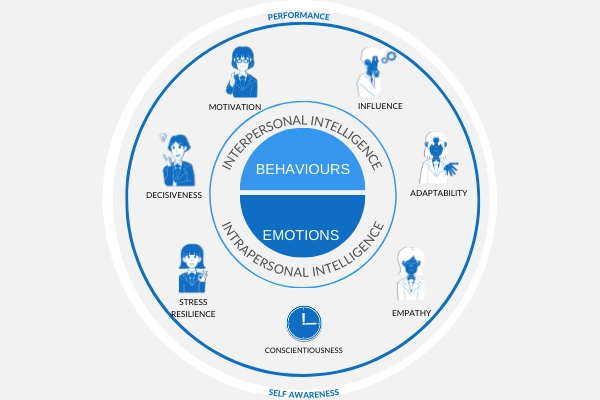Emotional intelligence and behaviours in leadership and the role they play in the workplace are often understated. It is the behaviour and emotional intelligence of leaders and the leadership that shape the culture of your organisation. Thus, your behaviour and emotions as a leader and the combined behaviours and emotions of the leadership team are key to shaping the culture. They set the tone of what is acceptable and unacceptable.
Emotional Intelligence, also known as Emotional Quotient (EQ) is the ability to understand, use and manage your own emotions and use them in positive ways. Understanding your behaviours and emotions at any given time will help you know how they affect you and others. They will help you get a better understanding of both interpersonal and intrapersonal relationships.
Motivation
Self-motivation is an indispensable tool for leaders. You need to have great energy and vibes to inspire the people around you. Your passion for your work and the vision you are championing will be apparent.
Having a positive attitude and being optimistic will help you see opportunities and solutions rather than problems. This can help build confidence in others around you.
You will also need to be driven and have the perseverance to see projects through. These two are very important, especially when things do not go to plan.

Influence
By the nature of its definition, leaders influence others. You persuade them to believe in your cause and in you. You will want people to listen to you and people will have an interest in what you have to say. What you say have an impact. You act as a role model. Your team looks up to you for direction and guidance.
You need to know you can have a positive as well as a negative influence. In most toxic work environments, the leaders tend to be part of the problem. For example, if you the leader is known to blame people for mistakes, you will find that others will follow suit. This will lead to a blame culture. In the same way, if your attitude is supportive, the people around you learn from it and become supportive themselves.
Adaptability
In today’s world, it is necessary for leaders to be adaptable. You will need to keep an open mind. You’ll have to be flexible in your approach as well as be innovative and inspiring.
Your adaptability will mean that you are accepting of ideas from others. You will encourage innovation in your team and give them the space to develop and grow.
Your ability to understand the changing nature of the business landscape should help you improve your planning. You will also be aware that people are afraid of change. They find change unsettling. Your strong interpersonal relationship will enable you to support your team to become adaptable.
Decisiveness
Leaders make several decisions routinely. Your style may be to make informed decisions based on the information you may have at hand. Others make decisions on impulse and in a haste. Some decisions may require you to consult with others. You will always have to be aware of how your decisions affect your business and its stakeholders.
Your desire to make decisions or your tendency to do so may be directly linked to your need for control. For example, do you expect to be involved in every decision? Do you have to be consulted every single time? Does your team or leadership team have the mandate to make independent decisions?
Stress
Stress continues to be one of the highest causes of work-related sickness absence. In most cases, leaders have a higher level of resilience than their teams. They also have the tendency to ignore the signs of stress. But leaders with high emotional intelligence recognise their own stress triggers and that of others. They are good at managing their stress levels. And are better at controlling their temper, diffusing, and managing conflicts. They develop the ability to relax and deal with the pressures of work.
With wellbeing high on the agenda for most organisations, you will need to be aware of how your stress levels affect your behaviour at work. Also, how it affects your interpersonal relationships.
Conscientiousness
Whether you are a maverick leader or a traditional leader, you may have a need to plan and structure. However, your desire to conform to or ignore rules will determine how much order or chaos follows you.
Are you good at meeting deadlines? Will you follow a plan, structure, or your rule book? Or do you get a buzz from chaos and uncertainties? Would you rather just deal with issues as they arise and not plan at all?
Empathy
Today’s leaders and future leaders need to show a lot of empathy. You will need the ability to recognise and be sensitive to other feelings. You will have to be respectful of other people’s needs and perspectives. Empathy strengthens both intrapersonal and interpersonal relationships. You get a better understanding of where people are and what is underpinning their behaviours and emotions at work. You will learn to be kind to yourself and others.
Self-awareness
As a self-aware leader, you know how you come across to others. You are aware of your emotions and behaviours. And you understand the correlation between interpersonal and intrapersonal relationships. You are aware of the impact of behaviours and emotions on yourself and others. Because you’re self-aware, you know that perception matters and that there are different viewpoints.
Emotional intelligence is important. It helps leaders develop the much-needed soft skills needed to develop and to grow. It makes you a better leader.

